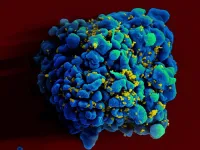(Press-News.org) FINDINGS
MitoQ, a mitochondrial antioxidant that is available to the public as a diet supplement, was found in a mouse study to reverse the detrimental effects that HIV and antiretroviral therapy (ART) have on mitochondria in the brain, heart, aorta, lungs, kidney and liver.
The researchers used a molecular method to measure the ratio of human and murine mitochondrial (mtDNA) to nuclear DNA (ntDNA) ratio, a measure of mitochondrial dysfunction. Reduction in this ratio reflects mitochondrial dysfunction. Compared to uninfected mice, HIV infected mice treated with ART had mitochondrial dysfunction in the human immune cells in the brain, heart, liver, lungs, and gut. ART itself also affected mitochondrial function in mouse heart cells. When treated with MitoQ for 90 days, HIV infected mice had reduced mitochondrial dysfunction in organs compared to HIV infected mice on ART.
BACKGROUND
Mitochondria are the key cell structures that are important for the smooth function of organs such as the brain, heart, liver and kidney. HIV causes a chronic state of inflammation and immune dysfunction that contribute to organ damage organs. The reasons for this are unclear, but it is known that mitochondrial dysfunction contributes to organ damage and is present in chronic HIV. There are no therapies for HIV associated diseases that affect organs such as the brain, heart and liver.
METHOD
The researchers used humanized mice, which have human immune cells that can be infected with HIV. They infected them with the virus, treated them with ART consisting of tenofovir disoproxil fumarate, emtricitabine, and raltegravir, then fed them MitoQ through drinking water for three months. The control mice were not given MitoQ.
The researchers note that humanized mice do not exactly recreate HIV infection in humans. Also, the infected mice were exposed to both the virus and the ART and they could not dissect the exact contribution of the virus versus the ART to mitochondrial dysfunction in human cells.
IMPACT
These preclinical findings could serve as the foundation for clinical trials in humans with HIV.
COMMENT
“MitoQ is a diet supplement that is known to be safe in humans and is readily available for use,” said senior author Dr. Theodoros Kelesidis, associate professor of medicine in the division of infectious diseases at the David Geffen School of Medicine at UCLA. “Our findings support clinical trials of MitoQ in people with HIV who take antiretrovirals to determine whether it can be a potential treatment for comorbidities associated with chronic HIV infection. Until then people with HIV should not take this diet supplement for treatment of any conditions associated with HIV infection.”
AUTHORS
Study co-authors are Sihyeong Song, Sandro Satta, Madhav Sharma, Cristelle Hugo, Athanasios Kossyvakis, and Shubhendu Sen Roy, all of UCLA.
JOURNAL
The study is published in the peer-reviewed Journal of Infectious Diseases.
FUNDING
The study was funded by the National Institutes of Health (R01AG059501, R21AI36708, R21HL134444, R03AG059462, R03AG059462, K08AI108272), the California HIV/AIDS Research Program (OS17-LA-002), and Campbell Foundation.
END
A readily available dietary supplement may reverse organ damage caused by HIV and antiretroviral therapy
2023-03-24
ELSE PRESS RELEASES FROM THIS DATE:
New research project aims to set standardized approach to lipoprotein(a) management
2023-03-24
DALLAS, March 24, 2023 — High levels of lipoprotein(a) [Lp(a)] are an independent, predominantly inherited and causal risk factor for cardiovascular disease, the leading cause of death and disability worldwide, according to a recent American Heart Association scientific statement. It is estimated that 1 in 5 Americans have high Lp(a) levels. Studies have shown that elevated Lp(a) — a low-density lipoprotein variant containing a protein called apolipoprotein(a) — is a risk factor for atherosclerosis (buildup of fatty material in artery walls) and related ...
Dr. Natalie Uy named chief of division of pediatric nephrology at Weill Cornell Medicine and NewYork-Presbyterian Komansky Children’s Hospital
2023-03-24
Dr. Natalie Uy, a leading pediatric nephrologist, has been named chief of the Division of Pediatric Nephrology in the Department of Pediatrics at Weill Cornell Medicine and NewYork-Presbyterian Komansky Children’s Hospital, effective April 17.
The Division of Pediatric Nephrology provides compassionate care for newborns, children and young adults with complex kidney diseases and urologic conditions. Services provided include dialysis and kidney transplantation for patients with end-stage kidney disease.
Dr. Uy was recruited to Weill Cornell Medicine as an assistant professor of pediatrics ...
Use age, not weight, to screen for diabetes
2023-03-24
· All racial/ethnic minority groups develop diabetes at lower weights than white adults
· Screening all adults aged 35 to 70 years identifies the greatest proportion of adults with prediabetes and diabetes
· A ‘huge portion’ of the U.S. population has undiagnosed prediabetes or diabetes
CHICAGO --- Focus on age, not weight, to capture the greatest number of people in all racial and ethnic groups with prediabetes and diabetes, reports a new Northwestern Medicine study.
Screening all adults ...
Framework helps local planners prepare for climate pressures on food, energy & water systems
2023-03-24
By David Chandler
As the world faces increasingly extreme and frequent weather events brought on by climate change – such as droughts, floods, heatwaves, and wildfires – critical civic resources such as food, water, and energy will be impacted. Local and regional planners need to anticipate those impacts and evaluate what measures can be taken to prepare.
Now, a multidisciplinary, multi-institutional team of researchers has built a detailed framework to provide guidance to these planners. After two years of in-depth consultation ...
Analysis of 3.6 million patient surgeries in England suggests it is safe to operate on patients 2 weeks after a positive COVID diagnosis, as long as they have recovered
2023-03-24
A new study of some 3.6 million surgeries from National Health Service (NHS) databases in England suggests that, in most cases, it will be safe to carry out planned surgery from 2 weeks after a positive COVID test, as long as the patient has recovered – compared to current guidance that recommends delaying surgery for 7 weeks. The study is published in Anaesthesia (a journal of the Association of Anaesthetists) and is by Dr Alwyn Kotzé, University of Leeds, UK and Dr Ciarán McInerney, ...
ORNL malware ‘vaccine’ generator licensed for Evasive.ai platform
2023-03-24
Access to artificial intelligence and machine learning is rapidly changing technology and product development, leading to more advanced, efficient and personalized applications by leveraging a massive amount of data.
However, the same abilities also are in the hands of bad actors, who use AI to create malware that evades detection by the algorithms widely employed by network security tools. Government agencies, banking institutions, critical infrastructure, and the world’s largest companies and their most used products are increasingly under threat from malware that can evade anti-virus systems, hijack networks, ...
THE LANCET: Health experts call for bold action to prioritize health over profit
2023-03-24
A new Series published in The Lancet describes how, although commercial entities can contribute positively to health and society, the products and practices of some commercial actors are responsible for escalating rates of avoidable ill health, planetary damage, and social and health inequity. Authors make key recommendations to ensure that contemporary capitalism is compatible with good population health.
The industries that produce just four harmful products – tobacco, alcohol, unhealthy food, and fossil fuels – account for at least a third of global deaths, illustrating the scale and huge economic cost of the problem.
Professor Rob Moodie, Series Lead ...
THE LANCET: Largest US state-by-state analysis of COVID-19 impact reveals the driving forces behind variations in health, education, and economic performance
2023-03-24
Peer-reviewed / Observational and modelling study / People
Four-fold variation in standardised COVID-19 death rates across US states between January 2020 and July 2022 – with death rates lowest in Hawaii, New Hampshire, and Maine and highest in Arizona, Washington, DC, and New Mexico.
COVID-19 exploited and compounded existing local racial inequities, health disparities, and partisan politics, resulting in a disproportionate burden of COVID-19 on communities of colour and in states that voted heavily Republican in the 2020 presidential election.
No link otherwise between state governors' ...
Risk of cervical cancer twice as high in women with mental illness
2023-03-24
Women with mental illness, neuropsychiatric disability, or substance abuse are less likely to go for gynaecological smear tests for cervical cancer and run more than twice the risk of developing the disease. The findings are presented in The Lancet Public Health by researchers from Karolinska Institutet, who stress the importance of proactively approaching these women as a preventative measure against cervical cancer.
In May 2020, the WHO approved a global strategy for eliminating cervical cancer as a women’s health problem. Part of the strategy is a requirement that 70 percent of women are screened for the disease at least once before age 35 and twice before ...
Poorest children have worse health and educational outcomes in adolescence
2023-03-24
Generation Z children born into the poorest fifth of families in the UK are 12 times more likely to experience a raft of poor health and educational outcomes by the age of 17 compared to more affluent peers, finds a new report led by UCL researchers.
The study, published in The Lancet Public Health, used data from the Millennium Cohort Study, a major study of more than 15,000 children born after the new millennium (September 2000 - January 2002) who are now in their early 20s.
Researchers collected data on five adverse health and social outcomes in adolescents aged 17 years, which are known to limit life chances: ...



